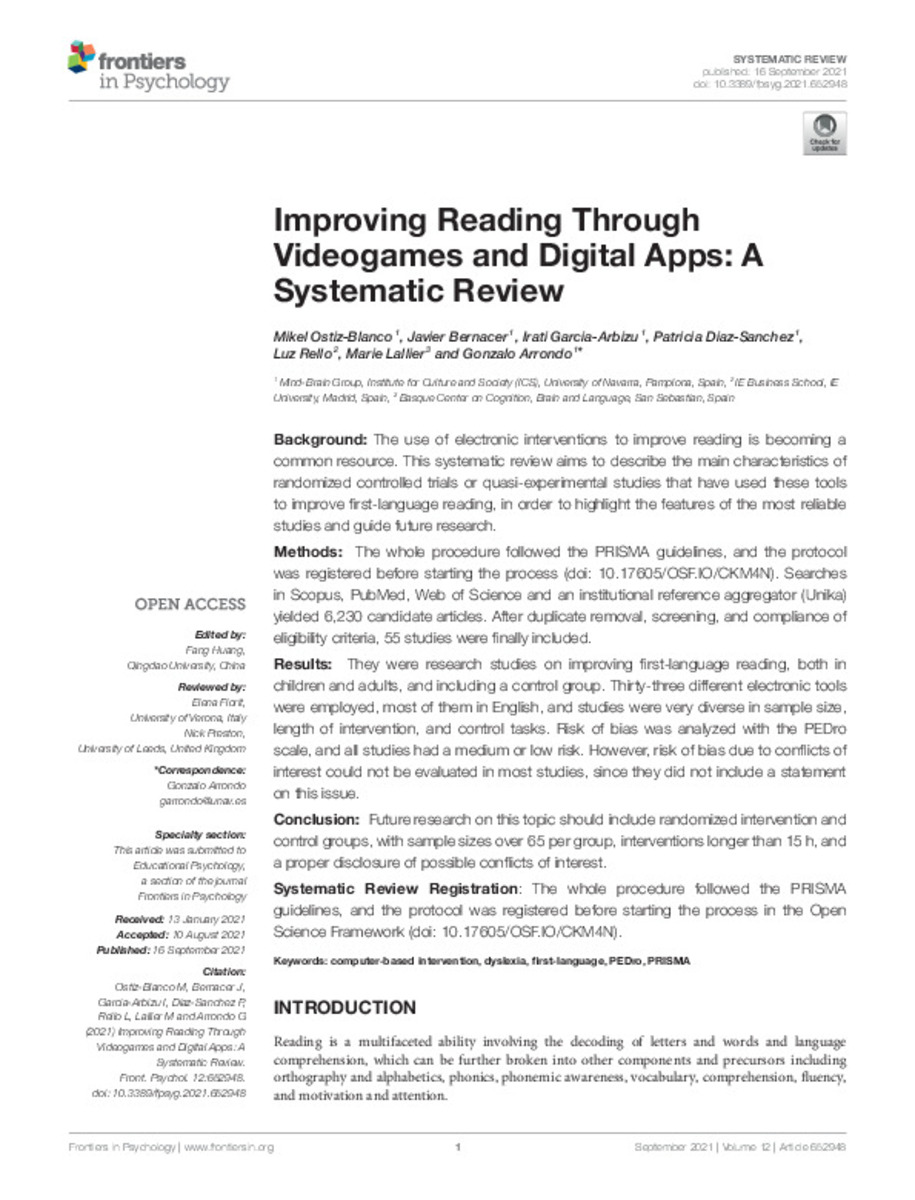Full metadata record
| DC Field | Value | Language |
|---|---|---|
| dc.creator | Ostiz-Blanco, M. (Mikel) | - |
| dc.creator | Bernácer-María, J. (Javier) | - |
| dc.creator | García-Arbizu, I. (Irati) | - |
| dc.creator | Díaz-Sánchez, P. (Patricia) | - |
| dc.creator | Rello, L. (Luz) | - |
| dc.creator | Lallier, M. (Marie) | - |
| dc.creator | Arrondo, G. (Gonzalo) | - |
| dc.date.accessioned | 2022-01-17T08:50:36Z | - |
| dc.date.available | 2022-01-17T08:50:36Z | - |
| dc.date.issued | 2021 | - |
| dc.identifier.citation | Ostiz-Blanco, M. (Mikel); Bernácer-María, J. (Javier); García-Arbizu, I.; et al. "Improving Reading Through Videogames and Digital Apps: A Systematic Review". Frontiers in Psychology. 12, 2021, 652948 | es |
| dc.identifier.issn | 1664-1078 | - |
| dc.identifier.uri | https://hdl.handle.net/10171/62728 | - |
| dc.description.abstract | Background: The use of electronic interventions to improve reading is becoming a common resource. This systematic review aims to describe the main characteristics of randomized controlled trials or quasi-experimental studies that have used these tools to improve first-language reading, in order to highlight the features of the most reliable studies and guide future research. Methods: The whole procedure followed the PRISMA guidelines, and the protocol was registered before starting the process (doi: 10.17605/OSF.IO/CKM4N). Searches in Scopus, PubMed, Web of Science and an institutional reference aggregator (Unika) yielded 6,230 candidate articles. After duplicate removal, screening, and compliance of eligibility criteria, 55 studies were finally included. Results: They were research studies on improving first-language reading, both in children and adults, and including a control group. Thirty-three different electronic tools were employed, most of them in English, and studies were very diverse in sample size, length of intervention, and control tasks. Risk of bias was analyzed with the PEDro scale, and all studies had a medium or low risk. However, risk of bias due to conflicts of interest could not be evaluated in most studies, since they did not include a statement on this issue. Conclusion: Future research on this topic should include randomized intervention and control groups, with sample sizes over 65 per group, interventions longer than 15 h, and a proper disclosure. | - |
| dc.language.iso | en | - |
| dc.rights | info:eu-repo/semantics/openAccess | - |
| dc.subject | Computer-based intervention | - |
| dc.subject | Dyslexia | - |
| dc.subject | First-language | - |
| dc.subject | PEDro | - |
| dc.subject | PRISMA | - |
| dc.title | Improving reading through videogames and digital apps: a systematic review | - |
| dc.type | info:eu-repo/semantics/article | - |
| dc.relation.publisherversion | https://www.frontiersin.org/articles/10.3389/fpsyg.2021.652948/full | - |
| dc.description.note | This is an open-access article distributed under the terms of the Creative Commons Attribution License (CC BY). | - |
| dc.identifier.doi | 10.3389/fpsyg.2021.652948 | - |
| dadun.citation.publicationName | Frontiers in Psychology | - |
| dadun.citation.startingPage | 652948 | - |
| dadun.citation.volume | 12 | - |
Files in This Item:
Statistics and impact
Items in Dadun are protected by copyright, with all rights reserved, unless otherwise indicated.






